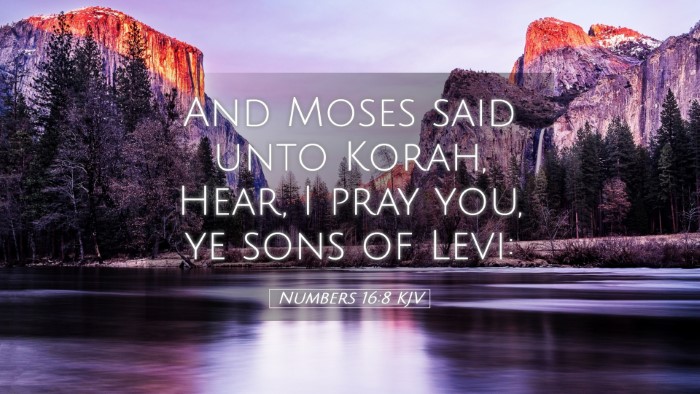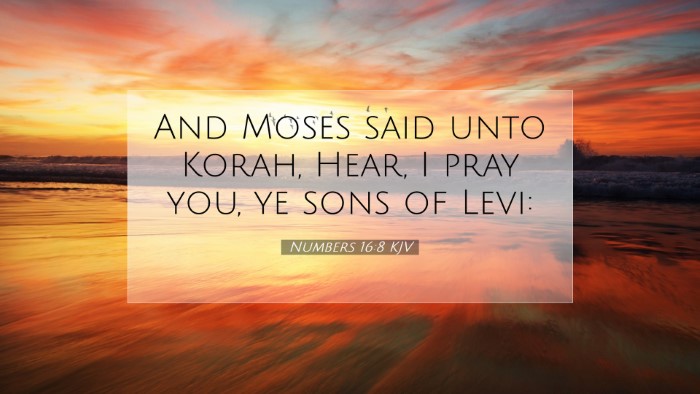Commentary on Numbers 16:8
Verse: Numbers 16:8 - "And Moses said unto Korah, Hear, I pray you, ye sons of Levi:"
Introduction
The narrative in Numbers 16 unfolds a significant challenge to God's appointed leadership through Moses and Aaron. At its heart, this verse reveals Moses’ direct address to Korah, a prominent Levite, amidst a rebel uprising. Understanding this context is vital for interpreting the implications of leadership, rebellion, and divine order within the camp of Israel.
Moses’ Call to Attention
Moses’ appeal begins with the phrase “Hear, I pray you,” signifying a moment of earnest pleading. This reveals Moses’ pastoral concern for the spiritual state of the Levites. The use of the word “pray” demonstrates Moses’ humility and the gravity of the situation.
- Pastoral Leadership: Moses embodies the traits of a true leader, inclined to engage with those who oppose him. He seeks to reason with Korah and his followers rather than swiftly resorting to authority.
- Significance of Levi: The mention of the "sons of Levi" speaks to Korah's high status within the community. This Levite lineage was tasked with sacred duties, positioning them closer to the worship and service of God.
Understanding Korah’s Challenge
Korah’s rebellion symbolizes a critical moment of challenge against divinely ordained authority. His desire was not only to usurp Moses’ leadership but to undermine the established worship order, which had profound implications for the Israelite community.
- Historical Context: Korah, along with Dathan, Abiram, and On, leads a faction that questions Moses and Aaron, claiming equal access to the divine. This sets the stage for confrontations centered on divine selection and leadership.
- Theological Implications: The rebellion highlights a tension in understanding God’s selection of leaders and the nature of jealousy and ambition among God’s people.
Leadership and Divine Authority
Navigating leadership dynamics in Israel leads us to explore the nature of authority ordained by God. Moses' response to Korah embodies the principle of humility in leadership against the backdrop of divine authority.
- Moses’ Authority: Moses does not leverage his position rashly but rather emphasizes the legitimacy of his calling. His humble approach illustrates that true authority in leadership stems from divine commission, not merely human recognition.
- Call to Accountability: Moses’ dialogue with Korah invites consideration of accountability among leaders. It underscores the need for those in positions of influence to engage with dissent graciously, hoping to redirect hearts towards obedience to God.
Theological Reflections
This confrontation serves as a robust frame for theological reflection on rebellion, the sovereignty of God, and the centrality of submission to His will. Each challenge to divinely appointed leadership brings forth questions about hierarchy, role, and responsibility.
- The Reality of Rebellion: Korah’s uprising reveals an eternal truth about human nature – the inclination towards rebellion against divine authority persists through generations.
- God's Everlasting Authority: The narrative climaxes in God's decisive action. This reinforces the foundational belief that God remains sovereign over His people and the systems of governance He establishes.
Application for Today’s Church
In contemporary ecclesial contexts, the warnings of Korah's rebellion resonate deeply. The church today must heed the implications of leadership, the perils of jealousy, and pride that can lead to division.
- Encouragement for Leaders: Leaders must emulate Moses, who combined authority with humility. They are called to foster environments where dialogue and accountability flourish.
- Importance of Community Unity: The verse serves as a call to nurture unity rather than allow discord to unravel the fabric of the church community.
Conclusion
Moses’ words to Korah in Numbers 16:8 serve as a poignant reminder of the challenges inherent in leadership within God's people. The passage invites introspection about our attitudes toward authority, our responsibilities as followers, and our responses to God’s chosen leaders.
Understanding this scripture equips pastors, students, and scholars to navigate the complexities of church leadership while honoring the divine appointment that comes from God alone.


